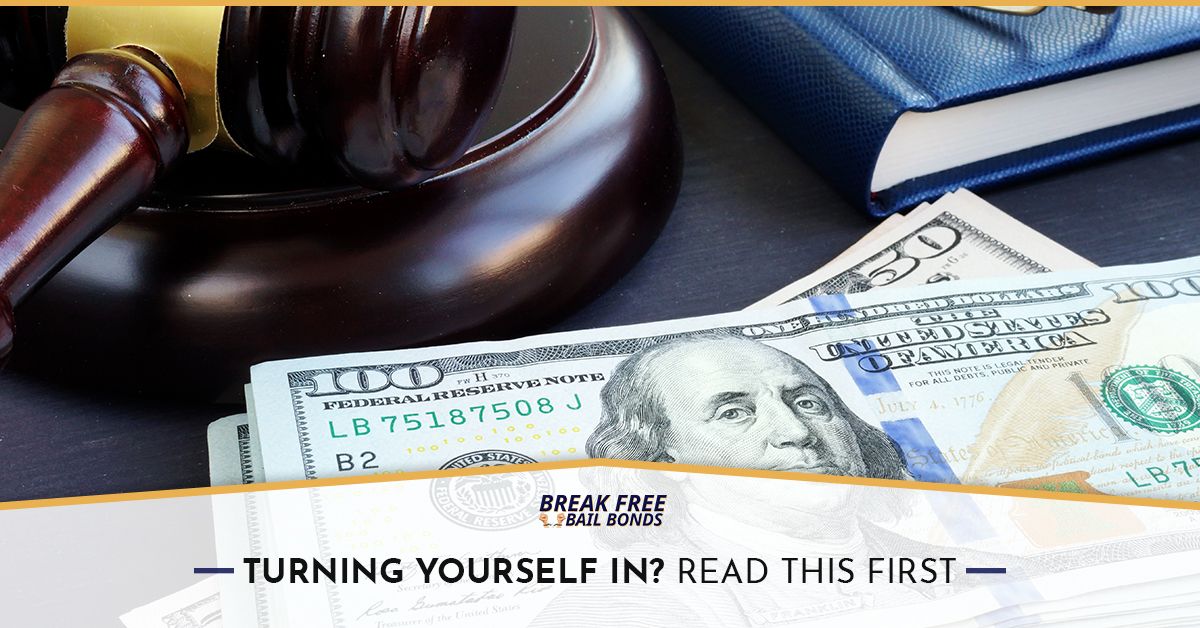If you have a warrant out for your arrest, you may be wondering what you should do. Unfortunately, ignoring the issue isn’t going to make it go away. One thing you can do is turn yourself in — while this may seem like the only option at this point, you still have other choices. In this blog, we’re going to talk about some things you should consider before you turn yourself in. If you have any questions, be sure to contact our bail bond company at Break Free Bail Bonds here in Oklahoma City.

TURNING YOURSELF IN? READ THIS FIRST
WHAT ARE MY CHARGES?
A good place to start when deciding how to deal with a warrant is to find out exactly what you’re being charged for. You have two options in this situation: either visit http://www.oscn.net/v4/ and check for any cases that have been filed, or you can contact our bondsmen who can call the Sheriff’s department and determine what the details of the warrant are. Break Free Bail Bonds is happy to help when you’re faced with charges such as
- Misdemeanor charges
- Felony charges
- Traffic/unpaid tickets, DUIs, or DWIs
- Drug charges
- Child support
- Assault and battery
- Domestic violence
- Weapons violations
- Theft
WHAT TYPE OF WARRANT IS IT?
There are two different types of warrant that you should know about. This may influence how you deal with it. The two types of warrants are bench warrants and cost warrants.
BENCH WARRANTS
When a defendant does not appear for a court hearing, a bench warrant is issued by a judge. They can also be filed when new charges have been made against a defendant or there is probable cause that a crime was committed.
COST WARRANTS
Also known as Rule 8 Warrants or Green Warrants, cost warrants are filed when you owe money to the court. This could be something like an unpaid fine or ticket. In some cases, you’ll be able to set up a payment plan or come in on your own to pay your dues but others will require you to work with a bondsman to post a bond that will guarantee you will return for court.

DO I NEED TO HIRE AN ATTORNEY?
Most courts will require you to have an attorney if you’re faced with a misdemeanor or felony. Although this may sound like a negative thing, your attorney will be able to give you advice, protect your rights, and represent you throughout the whole process. As such, you should hire a dependable attorney as soon as possible. Although most municipal and city courts won’t require you to have a lawyer, the decision is ultimately up to you.
CAN I GET A PUBLIC DEFENDER?
A public defender is an attorney who represents a client who isn’t able to afford the fees associated with a private attorney. This may seem like a no brainer, but you’ll need to fill out an application for a public defender and even that’s not a guarantee that you will be appointed one. The court will examine your income and financial situation to determine if you’re allowed a PD. Other factors will also be taken into consideration. For example, if you are disabled and unable to work or didn’t pay for your own bond, the court may appoint you a PD. It should be noted, however, that there is usually a small fee for submitting an application for a Public Defender.
CAN I APPLY FOR BAIL?
The warrant will usually specify how much the bond is. However, if you can’t find the bond amount anywhere, you may need to speak with the judge beforehand. If you hire an attorney, they may be able to help you reduce the bond amount, especially if it’s unreasonably high. If you’re faced with a cost warrant, some jurisdictions will accept a partial cash bond, then go back to a payment plan.
HOW MUCH WILL A BONDSMAN CHARGE?
Bondsmen usually charge around 10 percent of the bond amount. For smaller bonds, there is usually a minimum rate, just remember that the bond amount isn’t determined by the bail bond company, it’s set by the court. The only way to reduce it is to hire an attorney to represent you.
HOW SHOULD I PROCEED?
Although turning yourself in may seem like your only option, it’s usually best to speak with an attorney first. Every court does things a little differently, so depending on your charges, you may be able to settle the warrant without having to go to jail. It’s usually easier to work with your bail bondsman and attorney when you’re out of jail, so be sure to think through the pros and cons before making a decision. If you’d like to speak with a dependable bail bondsman in Oklahoma City, don’t hesitate to contact Break Free Bail Bonds.
